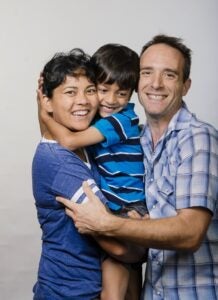
About FORWARD-MARCH
FORWARD-MARCH is the next step following a research study called FORWARD (Fragile X Online Registry With Accessible Research Database) that was started in 2012. The FORWARD study created the largest database of information on fragile X syndrome (FXS) in the United States. 25 peer-reviewed journal publications have resulted from FORWARD data, and many more papers are being developed.
The FORWARD-MARCH (Multiple Assessments for Research Characterization) project will collect more detailed information from participants with FXS and add it to the existing FORWARD database. FORWARD-MARCH continues the mission of FORWARD to better understand FXS in order to improve the lives of children and adolescents with FXS and the lives of their families.
Information collected from families like yours will be used to develop best practice guidelines for the care of individuals with FXS around the world!
This project was made possible by Cooperative Agreement 1 U01DD001298-01-00 from the Centers for Disease Control and Prevention.
Who can participate?
Only individuals with FXS born between 2003-2017 are eligible to participate in FORWARD-MARCH. This includes participants who were previously enrolled in the FORWARD study and those new to FORWARD.
What will happen in this study?
The FORWARD-MARCH project will collect survey data from parents and caregivers and conduct several tests with participants to understand their cognition (thinking), language, behavior, and autism characteristics. About two years after your clinic visit for FORWARD-MARCH, we will ask you to repeat the same questionnaires and tests and make a clinic visit. This is because information is expected to change somewhat over time. This will help us learn how individuals with FXS change over time and as they age.
You will receive a summary of your testing results from the assessments and can use these as needed to complement or inform school evaluations, or for other social or disability programming.
Joining FORWARD
Families who want to join FORWARD-MARCH should contact their nearest Fragile X clinic. Look for “This clinic participates in the FORWARD-MARCH study at the bottom of each clinic listing. Not all clinics participate in the study.
Frequently Asked Questions
You will be paid $100 at the completion of each visit to reimburse you for transportation costs and your time to complete the testing and questionnaires.
All FORWARD participants must be enrolled through a clinic. If you or your child has Fragile X and have questions about participating in FORWARD, please contact your Fragile X clinic.
Individuals must have FXS and be born between 2003-2017. All genders may enroll in FORWARD-MARCH.
The parent questionnaires can either be done at the clinic or remotely (using the internet). Completing all these questionnaires is expected to take 1-2 hours.
Your Fragile X Clinic doctor will collect medical information about the participant with FXS for FORWARD-MARCH. This will be standard medical information that is typically collected at clinic visits for medical management of FXS. The participants with FXS will then spend testing time with the psychologist/language specialist and study coordinator. It may take up to approximately 4 hours to complete all the measures and evaluations at the clinic visit.
The study will help facilitate research by allowing clinics to quickly and efficiently identify eligible participants who may be interested in a specific project.
The more individuals who enroll and contribute information, the more helpful the study will become in helping researchers understand FXS across the lifespan. Your family’s participation will help healthcare professionals and educators create better therapeutic and educational programs that could benefit millions of individuals with FXS throughout the world.
Records of participation in this research study will be maintained and kept confidential as required by law. This research project has a Certificate of Confidentiality from the Centers for Disease Control and Prevention that provides additional protection from involuntary disclosure of information collected in the study.
LEARN MORE
The CDC and Fragile X Syndrome
The CDC is working to learn more about Fragile X syndrome and Fragile X-associated disorders to improve the health and well-being of people with these conditions.
FORWARD Registry & Database
Learn more about FORWARD, the CDC, and virtual participation.
Our Most Recent Opportunities
Study: Recording the Experiences of Black and Hispanic Mothers who have Children with Fragile X Syndrome
Are you a Black or Hispanic woman raising a child with Fragile X syndrome? Researchers want to hear about your experiences. The South Carolina Family Experiences Lab is conducting 30-minute interviews to learn about the experiences of Black and Hispanic women raising a child with Fragile X syndrome. About the Study Who can participate? Black and Hispanic women of any age, who have a child with Fragile X syndrome, may [...]
Survey: What do you think about at-home research visits?
Dr. Schmitt and the Cincinnati Fragile X Center are conducting a survey to learn about potential barriers and advantages of conducting research visits in the home.
Study: Single Dose Study for Adult Women and Men with FXS
Dr. Craig Erickson at Cincinnati Children’s Hospital Medical Center is conducting a clinical trial to learn about if medication can change the brain’s response to sound, which may be abnormal in FXS.
Project WellCAST: Caregivers of Children with Fragile X Needed for a Research Study
The Kelleher Lab at Purdue University is conducting an NIH-funded clinical trial called Project WellCAST. Project WellCAST aims to understand how to best support caregivers of children with rare neurogenetic conditions, including Fragile X syndrome.
Study: Language, executive function, and quality of life of those with the Fragile X premutation
Researchers at the Waisman Center at UW-Madison are recruiting adults with the Fragile X premutation for a study on language, executive function, and quality of life.
Views and Experiences of Caregiver Coaching in Early Childhood Speech-Language Services: A Survey of Caregivers and Speech-Language Pathologists
The Research in Developmental Disabilities and Language Lab at The University of Wisconsin-Madison is conducting a survey to learn about you and your child’s experiences in speech therapy during early childhood.

